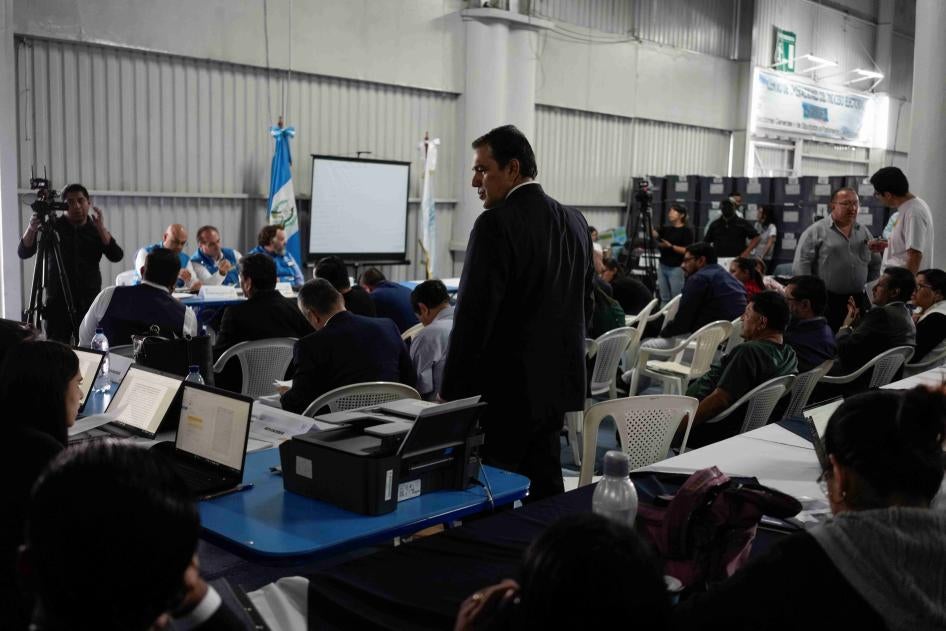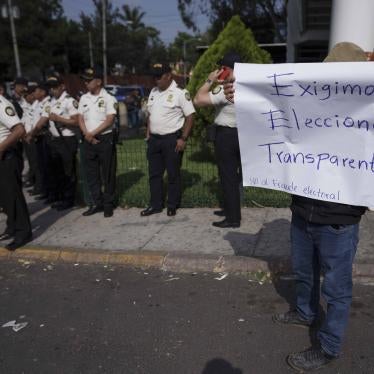(Washington, DC) – Guatemalan authorities should respect the results of elections held on June 25, 2023, Human Rights Watch and the Washington Office on Latin America (WOLA) said today. Concerned governments, including from Latin America, should urge the government and other authorities to ensure democratic values and respect the will of Guatemalans expressed at the polls.
The Supreme Electoral Tribunal (Tribunal Supremo Electoral, TSE), the highest authority in electoral matters in Guatemala, announced preliminary results on June 26 indicating that Sandra Torres and Bernardo Arévalo would compete in the runoff election in August. These and other election results were expected to be confirmed in in the following few days. But before the tribunal announced the final results, several political parties, including those of President Alejandro Giammattei, of Torres, and presidential candidate Zury Rios, brought a lawsuit alleging that fraudulent voting had tainted the election.
“Some of the losers of the elections in Guatemala are trying to abuse the court system to obtain the results they could not get in the ballots,” said Juan Pappier, acting deputy Americas director at Human Rights Watch. “International scrutiny will continue to be key to protect Guatemala’s right to vote in a country where there is little judicial independence left and little respect for the rule of law.”
The electoral missions of the Organization of American States and the European Union, which observed the elections, found no evidence of fraud or major irregularities that would call the results into question. Nonetheless, the Constitutional Court suspended the announcement of election results in a July 1 ruling. In doing so, the court disregarded the legal process for challenging voting irregularities and appeared to allow for recounts even at polling stations where the results were decisive, and no impropriety had been shown.
The nine political parties that brought the legal challenge included Vamos, a right-wing party of President Alejandro Giammattei; UNE, representing Torres; and Valor, associated with Ríos. Some candidates publicly alleged there had been “fraud” and called for a rerun of the election.
Both the European Union and the Organization of American States (OAS) electoral observation missions observed a “satisfactory election day” and recognized the “integrity of the electoral process.” The OAS mission confirmed that “challenges represent isolated cases that do not alter the preferences expressed at the polls” and noted that the Constitutional Court ruling “sow[s] doubts where there are none.” It warned, “feeding a narrative of fraud without evidentiary support undermines the will of the people and democratic institutions.”
The elections took place in a context of deterioration of the rule of law, where the institutions charged with overseeing the elections have little independence or credibility. Opposition candidates were barred and faced arbitrary criminal proceedings in an effort to create an uneven playing field.
The Organization of American States, the European Union, the Brazilian government, the US State Department, several European embassies in Guatemala, and some European governments, such as Norway, have expressed concerns about attempts to undermine the election results. Domestic observers, Indigenous leaders, some business sector associations, and human rights organizations have also said that Guatemala should respect the results and the integrity of the electoral process.
Other governments from Latin America should also express concern and call for respect for the electoral results and free and fair elections, Human Rights Watch and WOLA said.
“Setting aside a free and fair vote of the people would generate an unprecedented political crisis that would no longer merely jeopardize democracy but would actively undermine it,” said Ana María Méndez-Dardón, Central America director at WOLA. “Other governments should not stay silent; they should speak out in support of democracy as the right to vote is threatened.”








